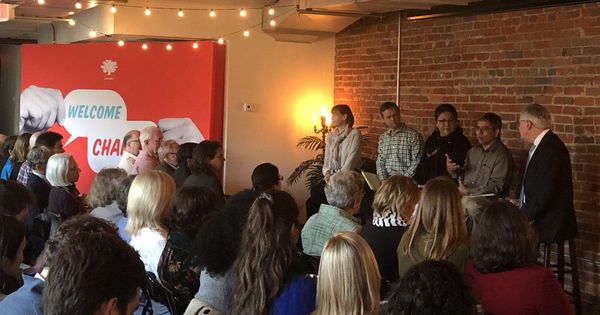
Ashoka Fellows, with host James Fallows, share surprising insights on rural innovation with an audience in Washington, D.C. (broadcast nationally). The discussion is part of the Welcome Change insights series, Ashoka’s national tour of solutions.
Ashoka
By Simon Stumpf
Earlier this week I spent a day with four innovators from rural America, including listening in on their discussion moderated by James Fallows, best-selling author and writer for The Atlantic. In kicking off the hour-long conversation, Fallows noted that “almost everything about our economics, our politics, our culture now is described in shorthand as a divide between the biggest cities, and the smallest cities,” with rural and small-town America having shifted in the popular discourse “from areas that often have problems, to areas that are a problem.”
We at Ashoka have always believed that the people closest to any challenge are best equipped to solve it. The four innovators who joined Fallows in the discussion illustrate this powerfully. They are:
Across these different industries, entrepreneur backgrounds, and corners of the country represented, some common themes emerged:
We’re all connected to rural America. Even though 20% of the U.S. population lives in towns of 25,000 or smaller, rural places and people provide almost all our food, fuel, fiber, and natural resources. As they say, without rural folks – miners, loggers, farmers, and the like – we’d all be cold, hungry, and without clothes to wear!
But conventional economic systems are linear and extractive, paying as little as possible for labor and raw materials. Over time, many rural people and environments become depleted and in many cases more insular.
In economic terms, rural areas therefore tend to be, economically speaking, poorer. And yet one of the most unhelpful (and untrue) stereotypes is that rural folks are ONLY poor, and that they need the help of “outside” programs.
One thing we all can do is commit to better understanding what rural poverty looks like. Brandon, Denisa, Stacey, and Regi pointed to a few key themes here. Rural poverty often manifests as a lack of meaningful choices that leads to a lack of agency. For example, existing “affordable” housing is often energy inefficient, so that living in poverty means spending as much as half your income (or more) on heating. And in the Navajo Nation, where the incidence of diabetes and nutrition-linked disease is high, it’s an almost total food desert (99% food desert).
Over time, in regions like Appalachia, these forces conspire to create a backdrop of, as Brandon puts it, generational poverty. “And that’s a different thing from circumstantial poverty, where you’ve had a good job, and you’ve lost it, and now you’re trying to get back in the workforce.”
Of course, rural areas are also rich, not just in natural resources but in social, physical, intellectual, and cultural capital, too. Relationships are deep, resourcefulness is a way of life, and creativity is necessary. It’s not surprising then that rural areas are in many respects entrepreneurial.
Social entrepreneurs across rural America tap into local assets and strengths and, against the backdrop of generational poverty in some places, creatively and profoundly change the very systems that are working against them. Their power often comes from reframing the problem and flipping challenges into opportunities.
- Denisa is shifting the focus from unhealthy people to systemic challenges and the solution from “make better personal choices” to collectively building an empowered, indigenous public health system.
- As Brandon sees it, the “workforce development” sector is too focused on placing recently out-of-work job seekers in employment when it should instead be focused on diversifying the local economy and creating jobs of the future.
- Stacey is transforming manufactured houses, historically seen as the “problem” in the affordable housing landscape, into the much-needed solution to inefficiencies in the traditional non-profit, site-built affordable housing model.
- Regi notes that our corporate food system and governments undervalue farm workers and ostracize small-farmers despite the fact that smallholders currently produce the majority of the world’s food and, with regenerative practices, can even cool the planet.
Perhaps most importantly, social innovators in rural America not only mitigate the harm caused by extractive industries and systems, but they change those very systems from the bottom up.
Energy, agriculture, and housing – industries that together account for more than half of human’s greenhouse gas emissions and that are all deeply rooted in rural America – need innovators in the coalfields and cornfields just as much as they do in Silicon Valley and on Capitol Hill. As Brandon shared, given their proximity to the land and connection to these systems, “I think rural communities have a uniquely important, and critical role to play in combating climate change.” Denisa agreed, noting that, “before we used to look back, and say, I’m a descendant of my ancestor. Now is a time to look forward and embrace the fact that we are the ancestors of our descendants.”
In Monday’s discussion, Fallows noted that the four changemakers are “an illustration of the innovation, and renewal, and experimentation” happening right now all across rural America, but that often goes overlooked.
At Ashoka, we are four years into a concerted effort to surface and support social entrepreneurs working in all geographies and representing the full diversity of this country. We’re seeing firsthand how solutions like those championed by Denisa, Brandon, Stacey, and Regi make us all stronger, smarter, more resilient. What does a future look like where we harness and celebrate the full market of ideas? We’re excited to find out and we hope you’ll join us.
Simon Stumpf is Ashoka’s Director of Venture and Fellowship in the U.S. He lives in rural Viroqua, Wisconsin, and in 2015 helped initiate and launch Ashoka’s All America work to redraw the map of social entrepreneurship support in America.
Special thanks to AT&T for supporting this work of Ashoka and sponsoring this conversation.
The article was origianlly posted at: %xml_tags[post_author]% %author_name% Source%post_title%
